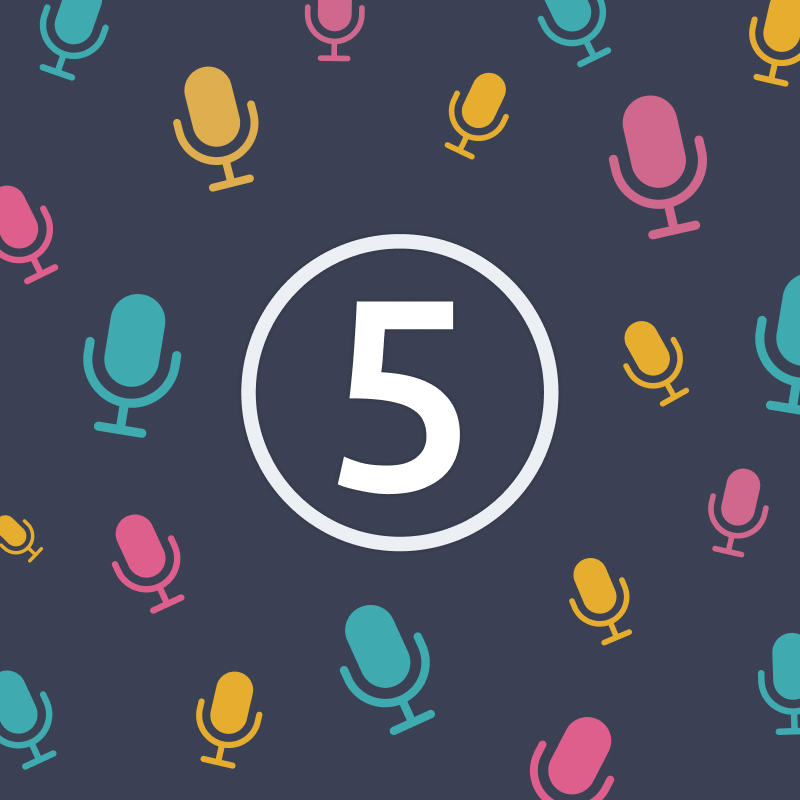If there’s one key ingredient for producing a high-quality podcast that listeners will love — other than your brillant, creative content, of course! — it’s the right microphone. A microphone is pretty much the great equalizer of the podcasting world. After all, you can’t create a great sounding podcast without a podcast microphone!
When I started my podcast in 2018, I was a total newbie to audio production. All I knew was that I wanted to have the best podcast microphone that was available (and affordable) to me. I figured that if I had the best microphone, I’d be setting myself up for success, especially since I had so much to learn about the other steps of recording and editing my show.
Nearly three years into my podcasting journey, I stand by my original theory about the importance of choosing the right podcast microphone, especially for podcast beginners and DIY-ers. Picking the perfect mic for your needs is especially crucial if you — like me — conduct remote interviews for your show. In the process of producing a remote podcast, there are a lot of elements that you can’t control, which is why it feels good to control the elements you can.
And guess what? You can control the quality of your audio. Your podcast microphone has a major part to play in that!
Why your podcast microphone matters
It might seem a little obvious, right? A great podcast microphone equals great remote interviews which equals a great podcast. Duh!
Amy Woods, the voice behind the Content 10x podcast agrees. “Nobody likes to listen to grainy audio, so do yourself (and your audience) a favor and invest in a microphone,” she says in a post for Medium.
Your mic is responsible for capturing your voice, then translating it from physical sound waves into digital bits and bytes. The better your mic, the nicer those digital bits and bytes will sound to your podcast audience.
If you happen to have a remote podcast (instead of one that records in a studio setting), you want to do everything you can to make your home recording setup as high-quality as possible.
5 of the most user-friendly podcast microphones for remote podcasting
I can guess what you’re thinking: “A high-quality podcast microphone sounds expensive. And I’m a DIY podcaster! Can I afford to sound that good?”
You totally can.
There are, of course, excellent mics on the market that are meant primarily for professionals and studio settings. Those tend to have a higher price tag! The suggestions below start at $74.95, which may fit more easily into your bootstrapped budget.
But there are plenty of options out there that can fit into any budget. It’s all about finding the best podcast microphone for you, whether you’re just starting out and need something simple to practice on or are looking for something a bit more advanced.
Here are 5 awesome podcast microphones for remote podcasters. We’ve included pricing from Amazon below, but do your homework before you buy! Prices fluctuate depending on which vendor you choose to buy from
1. The Blue Yeti
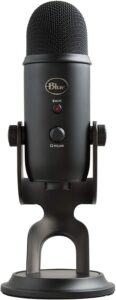 I’ll start with the podcast microphone that I actually use! I chose this mic based on my own research nearly three years ago and I’m still recording my remote interviews with it today. Here are some of the advantages of this mic:
I’ll start with the podcast microphone that I actually use! I chose this mic based on my own research nearly three years ago and I’m still recording my remote interviews with it today. Here are some of the advantages of this mic:
- It has a plug and play USB connection, which makes it super easy to use. And I can confirm that! Remember: I was a total newbie when I got started, and all I had to do to get acquainted with the Blue Yeti was plug it into my computer.
- It has a wide range of recording patterns. While you can definitely use it for remote interview recordings, you can also adjust it for group recordings and face-to-face sessions.
- It comes with a stand, which you would normally need to buy separately.
The Blue Yeti was at the higher end of what I would have liked to pay for a podcast microphone at the beginning of my podcasting career, but it’s served me well for years now and hasn’t required any maintenance or updates. I call it a great investment!
Price: $129.99
2. Samson Q2U
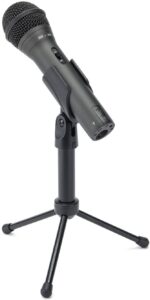 The Samson Q2U is The Podcast Host’s number-one recommendation for new podcasters. If you want to start a show without spending too much money, this may be the best microphone for you!
The Samson Q2U is The Podcast Host’s number-one recommendation for new podcasters. If you want to start a show without spending too much money, this may be the best microphone for you!
One of the biggest advantages of this mic is that it can grow with you in your podcasting journey. Early on, you can plug it directly into your computer’s USB port and record your remote interview (via SquadCast, for example!). Later on — you can upgrade the cables on the mic to XLR, which is what the pros use, in tandem with a sound mixer or a digital recorder instead of a computer — without buying a new podcast microphone.
The Samson Q2U is a good place to start and will give you much higher-quality audio than your computer’s internal microphone or a cheap headset mic.
Price: $79.99
3. The Rode Podcaster
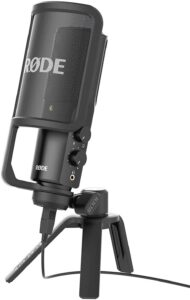 If you want to go pricier than the other mics I’ve mentioned, the Rode Podcast could be the right choice.
If you want to go pricier than the other mics I’ve mentioned, the Rode Podcast could be the right choice.
The Rode NT USB microphone is similar to microphones that professional podcasters use in their studios, but can be plugged into your computer at home. Unlike the Blue Yeti — which is a condenser mic — the Rode microphone is dynamic. Dynamic mics “record a narrower range of frequencies, and so can sound a little less rich. They record less surrounding noise, so you have to be right up close to the mic. But, because of both of those features, they can be lovely and quiet, and forgive much worse recording environments.”
Basically, a dynamic podcast microphone like the Rode NT USB may be the best podcast microphone for you if you anticipate recording many of your remote interviews in louder, less reliable environments.
Price: $169.00
4. The MXL990
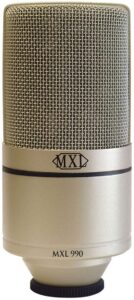 Are you expecting to record most of your remote interviews sitting at a desk in a quiet environment? Then a condenser mic might be a better fit for your needs. The MXL990 is a nice alternative to the Blue Yeti and The Podcast Host notes that it gets you “ridiculously good value.” It comes highly recommended from them for anyone looking for rich sound on a budget.
Are you expecting to record most of your remote interviews sitting at a desk in a quiet environment? Then a condenser mic might be a better fit for your needs. The MXL990 is a nice alternative to the Blue Yeti and The Podcast Host notes that it gets you “ridiculously good value.” It comes highly recommended from them for anyone looking for rich sound on a budget.
One downside to the MXL990 is that it does use an XLR microphone, which means you need to operate it with a sound mixer or digital recorder, instead of your computer. Since more equipment is required, this kind of podcast microphone is a bit more of a commitment than some of the others.
Price: $74.95
5. AKG Lyra
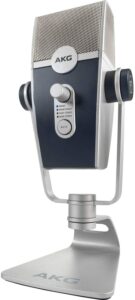 This microphone shares many features with the Blue Yeti. It has multiple recording patterns and a built-in stand. It’s a little more expensive than Blue Yeti, though, so it could be a nice next step or more upscale option.
This microphone shares many features with the Blue Yeti. It has multiple recording patterns and a built-in stand. It’s a little more expensive than Blue Yeti, though, so it could be a nice next step or more upscale option.
The AKG Lyra is also really easy to set-up. It’s plug and play, so once you take it out of the packaging and get it connected to your computer, you’ll be well on your way to recording fantastic podcast interviews.
Price: $149.00
Once you have the best podcast microphone picked out for your needs, you can use it to record awesome remote podcast interviews! Check out the SquadCast basics here.
Zachariah Moreno is the co-founder, CEO, & CTO of SquadCast. He is also a podcaster, author, developer, and designer. He and his team are on a mission to amplify collaboration.
